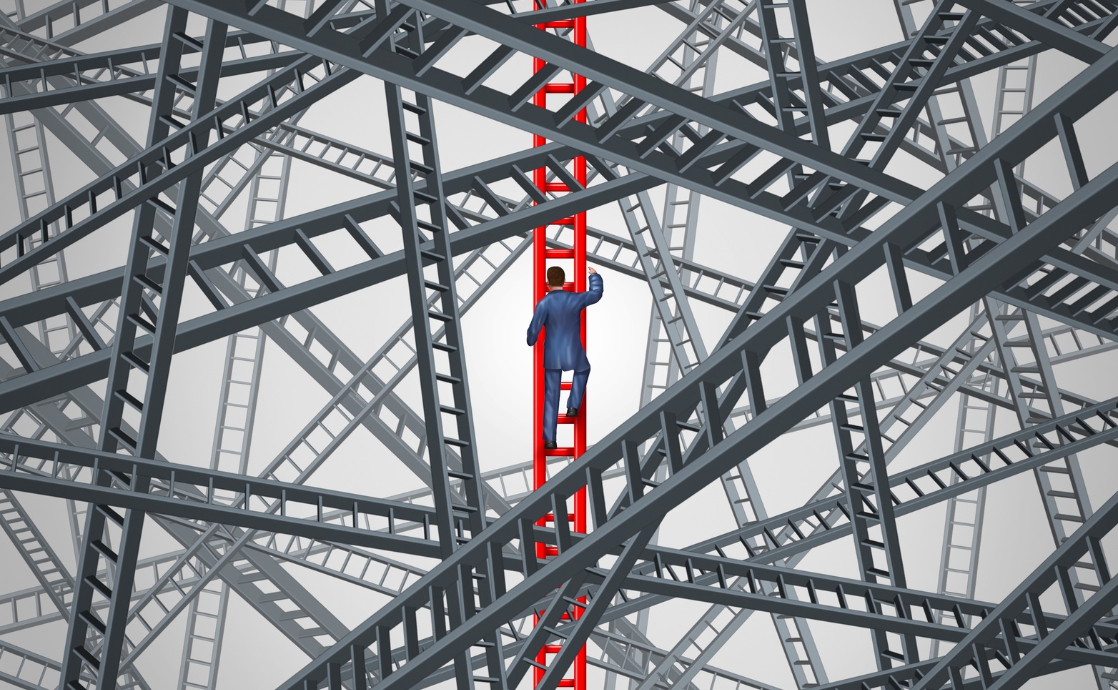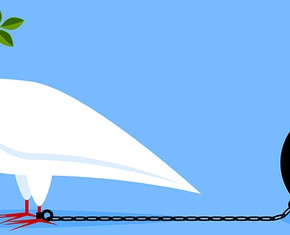The views expressed in our content reflect individual perspectives and do not represent the authoritative views of the Baha'i Faith.
Do you feel exhausted, drained, anxious, like you’re living through a really, really tough time? Does the rapid, disruptive evolution of society make you yearn to return to a simpler, less complicated era?
Do you feel unprepared for the massive upheavals now happening in the world? Has the pandemic upset your equilibrium? Do wars and rumors of wars make everything feel unstable? Do you have the sense that a quickly-accelerating pace of change will leave you outmoded and irrelevant? Has our chaotic, frantic modern life simply worn you down and out?
If you answered yes to even one of those questions, you’re not alone. The stresses of contemporary society and the fear of a disintegrating future seem to pervade every aspect of our daily existence. Those stressors have all contributed to a global age of anxiety.
Experts call this feeling “discontinuity” – a distinct break in our normal sense of continuity, a sharp difference between now and the recent past. Typically, discontinuity happens to anyone who goes through a sudden period of great change. When society changes at warp speed, we get whiplash.
When tragedy strikes – a pandemic, a war, a natural disaster – we hurtle from our normal lives into the unexpected at warp speed. This creates anxiety, fear, and discontinuity.
The journalist Elizabeth Weil, writing in a recent article in the New York Times, defined what our dread of discontinuity means, and how it can afflict anyone:
Most of us have dragged our feet and deluded ourselves for too long about the state of the world. While we remain stuck, our world pulled away from our understanding of it. We’ve now fallen into a gap in our apprehension of reality. We need to acknowledge this, size up the rupture, then hurl ourselves over the breach.
RELATED: In An Increasingly Interdependent World, We Must Unite
We can hurl ourselves over that breach, Baha’is believe, by deepening our knowledge of the spiritual reality of the present age. That underlying reality, Baha’u’llah, the prophet and founder of the Baha’i Faith, taught, involves the concept of the coherence and continuity of all divine revelation:
It is clear and evident to thee that all the Prophets are the Temples of the Cause of God … If thou wilt observe with discriminating eyes, thou wilt behold Them all abiding in the same tabernacle, soaring in the same heaven, seated upon the same throne, uttering the same speech, and proclaiming the same Faith.
But today, we seem to live in a time of significant discontinuity, of rapid and ever-accelerating alteration – of a major break from the past. How do we reconcile these two realities, one of them abiding and continual, the other fragmented and filled with chaos?
To start, let’s briefly reflect on recent human history. In a little more than a century, during the span of the longest lifetimes of the seven billion+ people who now live on Earth, we human beings have experienced a sharp, sudden quickening in science, technology, and our relationship to one another. After countless centuries of very slow and almost imperceptible evolution, we have made unprecedented advances. The world, now encircled with commerce, communication, and unprecedented cultural exchange, has shrunken and contracted into a virtual neighborhood. Our collective consciousness has enlarged massively. The old, absolute reign of kings and rulers has largely disappeared. We now find ourselves hurtling toward an unknown future from an increasingly distant past, moving so fast that even the pace of change itself can disorient and confuse us.
Baha’is believe that all of these discontinuities signal the dawn of a new reality across our planet – we have begun to comprehend our essential human oneness. Borders of all kinds have become less restrictive. Science continually confirms the interdependence of all living things. New revelations about DNA and our human ancestry have led to an increasing realization of our shared humanity. Many have acted to re-define or even jettison the old categories of religion, race, nationality, and class. Global issues – human rights, migration, climate change, terrorism, the coronavirus pandemic – have eclipsed all others, moving to the forefront of our concerns.
Despite these major leaps forward – or perhaps because of them – people share a sense of severe discontinuity. Traditional systems feel broken. Once reliable alliances have shifted. Time-tested approaches no longer produce the same results. The world, to many, seems poised on the brink of breakage, debacle, disaster. Many have developed an intuitive understanding that reality has ruptured.
We get these feelings because, for many, our past experience has ceased to provide us with a workable framework for a future life. That’s discontinuity – the stressful realization that we no longer fully understand our world and cannot predict where it’s headed. The writer and futurist Alvin Toffler called it “future shock” – which means that the reality we thought we inhabited no longer survives, and that our skills for navigating that past existence no longer work in the new one.
RELATED: What Does the “New World Order” Mean?
The Death-Pangs of the Old Order
Baha’u’llah predicted this personal and societal discontinuity in the 19th century when he wrote: “Soon will the present-day order be rolled up, and a new one spread out in its stead.” In 1934 Shoghi Effendi, the Guardian of the Baha’i Faith, said: “We stand on the threshold of an age whose convulsions proclaim alike the death-pangs of the old order and the birth-pangs of the new.”
Do you feel unprepared for the demise of the world’s existing social order? Many people do. We all depend on that old order, regardless of its deficiencies, for our sustenance, our livelihoods, and our general sense of stability. Despite that fact, larger forces are at work in the world, exerting powerful gravitational influences on the course of humanity’s future. Those larger forces can seem mysterious, unseen, and even threatening – but if we seek to better understand them, it can help us free ourselves from our disquieting, disturbing feelings of discontinuity.
The Baha’i teachings identify and explain those larger forces, by not only analyzing and assessing our current state of society, but also by providing a broad vision of what our human family can expect in that future state of civilization we’re speeding towards. In fact, the global Baha’i community offers humanity an antidote for discontinuity – a plan for reaching a more hopeful and promising future. So whether you’re a Baha’i or not, understanding those greater forces can help navigate a rapidly-evolving reality.
Baha’u’llah, not long after he proclaimed the advent of this new spiritual system, wrote:
The world’s equilibrium hath been upset through the vibrating influence of this most great, this new World Order. Mankind’s ordered life hath been revolutionized through the agency of this unique, this wondrous System – the like of which mortal eyes have never witnessed.
The Baha’i teachings say that when Baha’u’llah’s revelation dawned, an extremely powerful global earthquake in the spiritual fundament of all humanity occurred. A new divine messenger brought all people a set of teachings intended to revolutionize “mankind’s ordered life.” In the same way the revelations of Christ and Muhammad and Buddha had a profoundly transformative impact on humanity, this new revelation has had a similar effect, and will continue to drive change.
The body of those teachings and their lasting influence, Baha’is believe, have caused and will continue to cause great discontinuity in “the world’s equilibrium.” Understanding the dynamics of this social ufbpheaval can help everyone navigate such rapid and revolutionary change.
The Birth-Pangs of the New Order
In his book The World Order of Baha’u’llah, Shoghi Effendi examined the two larger societal and spiritual forces Baha’u’llah’s revelation released, and deftly summarized them this way:
As we view the world around us, we are compelled to observe the manifold evidences of that universal fermentation which, in every continent of the globe and in every department of human life, be it religious, social, economic or political, is purging and reshaping humanity in anticipation of the Day when the wholeness of the human race will have been recognized and its unity established. A twofold process, however, can be distinguished, each tending, in its own way and with an accelerated momentum, to bring to a climax the forces that are transforming the face of our planet. The first is essentially an integrating process, while the second is fundamentally disruptive. The former, as it steadily evolves, unfolds a System which may well serve as a pattern for that world polity towards which a strangely-disordered world is continually advancing; while the latter, as its disintegrating influence deepens, tends to tear down, with increasing violence, the antiquated barriers that seek to block humanity’s progress towards its destined goal. The constructive process stands associated with the nascent Faith of Baha’u’llah, and is the harbinger of the New World Order that Faith must erelong establish. The destructive forces that characterize the other should be identified with a civilization that has refused to answer to the expectation of a new age, and is consequently falling into chaos and decline.
A titanic, a spiritual struggle, unparalleled in its magnitude yet unspeakably glorious in its ultimate consequences, is being waged as a result of these opposing tendencies …
Seeing the accelerating evolution of the world, and the problems it provokes, in the context of these dual integrative and disintegrative forces can help us start to understand the reasons behind such bewildering discontinuity.
In the next installment in this short series of essays, we’ll explore the ramifications of the “universal fermentation … purging and reshaping humanity,” and examine how we can each react and respond to those titanic forces transforming the face of our planet.
















Comments
Sign in or create an account
Continue with Googleor